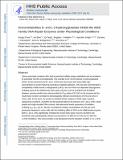| dc.contributor.author | Chen, Fangyi | |
| dc.contributor.author | Bian, Ke | |
| dc.contributor.author | Tang, Qi | |
| dc.contributor.author | Humulock, Zachary T. | |
| dc.contributor.author | Li, Deyu | |
| dc.contributor.author | Fedeles, Bogdan I | |
| dc.contributor.author | Singh, Vipender | |
| dc.contributor.author | Essigmann, John M. | |
| dc.date.accessioned | 2018-09-17T16:16:25Z | |
| dc.date.available | 2018-09-17T16:16:25Z | |
| dc.date.issued | 2017-04 | |
| dc.identifier.issn | 0893-228X | |
| dc.identifier.issn | 1520-5010 | |
| dc.identifier.uri | http://hdl.handle.net/1721.1/118110 | |
| dc.description.abstract | Cancer-associated mutations often lead to perturbed cellular energy metabolism and accumulation of potentially harmful oncometabolites. One example is the chiral molecule 2-hydroxyglutarate (2HG); its two stereoisomers (d- and l-2HG) have been found at abnormally high concentrations in tumors featuring anomalous metabolic pathways. 2HG has been demonstrated to competitively inhibit several α-ketoglutarate (αKG)- and non-heme iron-dependent dioxygenases, including some of the AlkB family DNA repair enzymes, such as ALKBH2 and ALKBH3. However, previous studies have only provided the IC50values of d-2HG on the enzymes, and the results have not been correlated to physiologically relevant concentrations of 2HG and αKG in cancer cells. In this work, we performed detailed kinetic analyses of DNA repair reactions catalyzed by ALKBH2, ALKBH3, and the bacterial AlkB in the presence of d- and l-2HG in both double- and single-stranded DNA contexts. We determined the kinetic parameters of inhibition, including kcat, KM, and Ki. We also correlated the relative concentrations of 2HG and αKG previously measured in tumor cells with the inhibitory effect of 2HG on the AlkB family enzymes. Both d- and l-2HG significantly inhibited the human DNA repair enzymes ALKBH2 and ALKBH3 at pathologically relevant concentrations (73-88% for d-2HG and 31-58% for l-2HG inhibition). This work provides a new perspective that the elevation of the d- or l-2HG concentration in cancer cells may contribute to an increased mutation rate by inhibiting the DNA repair performed by the AlkB family enzymes and thus exacerbate the genesis and progression of tumors. | en_US |
| dc.description.sponsorship | National Institutes of Health (U.S.) (grant number 2 P20 GM103430) | en_US |
| dc.description.sponsorship | Rhode Island Foundation (Medical Research Funds grant) | en_US |
| dc.description.sponsorship | National Institutes of Health (U.S.) (grant P01 CA2673) | en_US |
| dc.description.sponsorship | National Institutes of Health (U.S.) (grant R01 CA080024) | en_US |
| dc.description.sponsorship | National Institutes of Health (U.S.) (grant P30 ES002109) | en_US |
| dc.publisher | American Chemical Society (ACS) | en_US |
| dc.relation.isversionof | http://dx.doi.org/10.1021/ACS.CHEMRESTOX.7B00009 | en_US |
| dc.rights | Article is made available in accordance with the publisher's policy and may be subject to US copyright law. Please refer to the publisher's site for terms of use. | en_US |
| dc.source | PMC | en_US |
| dc.title | Oncometabolites D- and L-2-hydroxyglutarate Inhibit the AlkB Family DNA Repair Enzymes under Physiological Conditions | en_US |
| dc.type | Article | en_US |
| dc.identifier.citation | Chen, Fangyi, Ke Bian, Qi Tang, Bogdan I. Fedeles, Vipender Singh, Zachary T. Humulock, John M. Essigmann, and Deyu Li. “Oncometabolites D- and L-2-hydroxyglutarate Inhibit the AlkB Family DNA Repair Enzymes under Physiological Conditions.” Chemical Research in Toxicology 30, no. 4 (March 24, 2017): 1102–1110. | en_US |
| dc.contributor.department | Massachusetts Institute of Technology. Center for Environmental Health Sciences | en_US |
| dc.contributor.department | Massachusetts Institute of Technology. Department of Biological Engineering | en_US |
| dc.contributor.department | Massachusetts Institute of Technology. Department of Biology | en_US |
| dc.contributor.department | Massachusetts Institute of Technology. Department of Chemistry | en_US |
| dc.contributor.mitauthor | Fedeles, Bogdan I | |
| dc.contributor.mitauthor | Singh, Vipender | |
| dc.contributor.mitauthor | Essigmann, John M | |
| dc.contributor.mitauthor | Li, Deyu | |
| dc.relation.journal | Chemical Research in Toxicology | en_US |
| dc.eprint.version | Author's final manuscript | en_US |
| dc.type.uri | http://purl.org/eprint/type/JournalArticle | en_US |
| eprint.status | http://purl.org/eprint/status/PeerReviewed | en_US |
| dc.date.updated | 2018-08-28T18:18:25Z | |
| dspace.orderedauthors | Chen, Fangyi; Bian, Ke; Tang, Qi; Fedeles, Bogdan I.; Singh, Vipender; Humulock, Zachary T.; Essigmann, John M.; Li, Deyu | en_US |
| dspace.embargo.terms | N | en_US |
| dc.identifier.orcid | https://orcid.org/0000-0001-5252-826X | |
| dc.identifier.orcid | https://orcid.org/0000-0002-8241-4834 | |
| dc.identifier.orcid | https://orcid.org/0000-0002-2196-5691 | |
| mit.license | PUBLISHER_POLICY | en_US |
